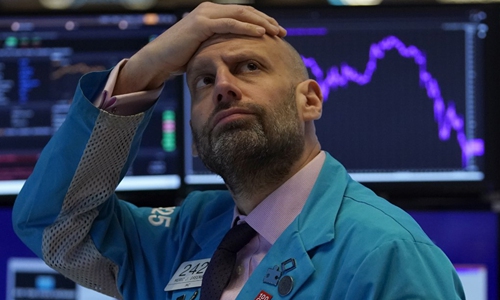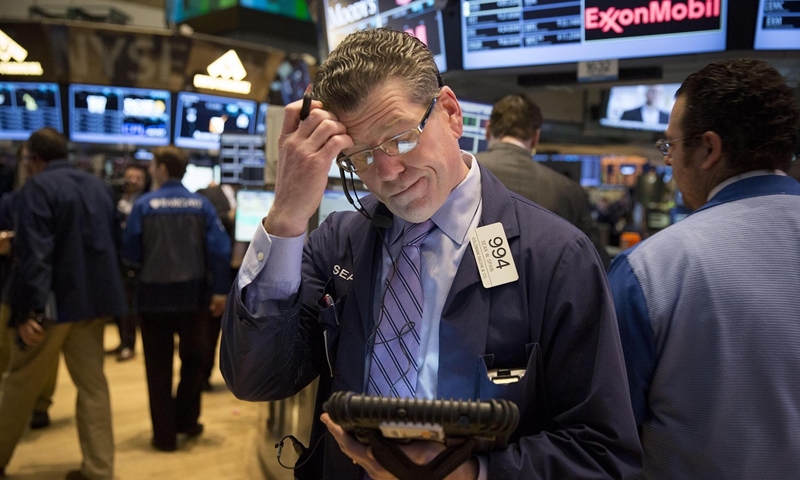SOURCE / MARKETS
Chinese financial markets become 'Noah’s ark' for international capital
China’s assets show advantages over US ones in stability, yields

Meric Greenbaum, Designated Market Maker IMC financial looks up at the board before the opening bell right before trading halted on the New York Stock Exchange on March 9, 2020 in New York. Photo: AFP
China's capital market is becoming the "Noah's ark," or the safe haven for global investors as Wall Street and other markets crashed Monday under mounting fears of the coronavirus spread, Chinese financial experts said, predicting that Chinese stock market should be the only major market to have a bullish year in 2020.
On Tuesday, following a grim day for US and European markets, the Shanghai Composite Index was up 1.82 percent to 2,996.76 points, while the Shenzhen market was up 2.65 percent to 11,403.47 points. More than 3,000 stocks rose, and 141 touched the daily ceiling of 10 percent rise.
The stellar performance of China's stocks came just a few hours after global investors saw a relentless storm on Wall Street. On Monday, the Dow Jones Industrial Average plunged nearly 8 percent, down more than 2,000 points. The S&P 500 saw its biggest drop since December 2018, with a decline of 7.6 percent.
Elsewhere, the stock indexes in Britain and Germany were down 7 percent, and Japan's benchmark was down 5 percent on Monday.
"The Chinese stock markets are increasingly becoming a 'stabilizer', or Noah's Ark, as Chinese shares often bounce back first after collective crashes on other markets. Even though they also correct from time to time under external pressure, China's market tends to be less volatile if compared with Wall Street and the European markets," Li Daxiao, chief economist at the Shenzhen-based Yingda Securities, told the Global Times on Tuesday.
The Shanghai stock index dropped roughly 3 percent this year. In comparison, the Dow Jones has plunged by more than 17 percent.
It's not all about stocks. The US Treasury yield curve fell below 1 percent on Monday for the first time ever as yields on the benchmark 10- and 30-year bonds slumped to record lows, pushing the yield spread between Chinese government and US Treasury bonds to above 200 basis points.
"The Chinese financial assets are showing advantages over US ones, whether in terms of stability or yields, not to mention China's economy will hopefully rebound sooner than other economies," Li said.
In February, overseas investors bought 127.1 billion yuan ($18.3 billion) worth of Chinese bonds, up 134 percent compared with January, according to media reports.
Li said that currently overseas capital only accounts for about 2 percent of China's total financial investment, compared with 20-30 percent in mature markets. "With ample room for capital inflows and the benefits of the Chinese economy, overseas capital will speed up flowing into China."
To fuel economic growth, Chinese economists have mixed opinions about whether the government needs to take more aggressive measures in terms of easing monetary policy, after central banks worldwide are cutting interest rates to cushion the impact of the coronavirus.
Cao Yuanzheng, chief economist at Bank of China International, noted that facing challenges from the coronavirus, China's handling of monetary policy seems to be more rational.
"It's very likely that some nations will continue to cut interest rates or, if the coronavirus develops further, use a flood of liquidity to support their capital markets. But China is not likely to adopt too drastic measures (like a massive interest rate cut) or use monetary stimulus too frequently," Cao told the Global Times on Tuesday, adding that China is likely to target monetary support at small-sized businesses to help them weather the virus blow.
Chinese finance expert Zhao Qingming nevertheless suggested the government be bolder and cut interest rates.
"China's economy should return to normal by the end of March, but the country needs an above 7 percent growth in the upcoming quarters if it is to maintain yearly growth of 5.5 percent or higher. Therefore, China should lower interest rates to inject momentum to economic growth and it is better done as soon as possible," Zhao said.
Li also predicted that China might cut interest rates soon, but said that it won't reduce the appeal of China's financial assets as China's interest rate level would still be higher than the US.



